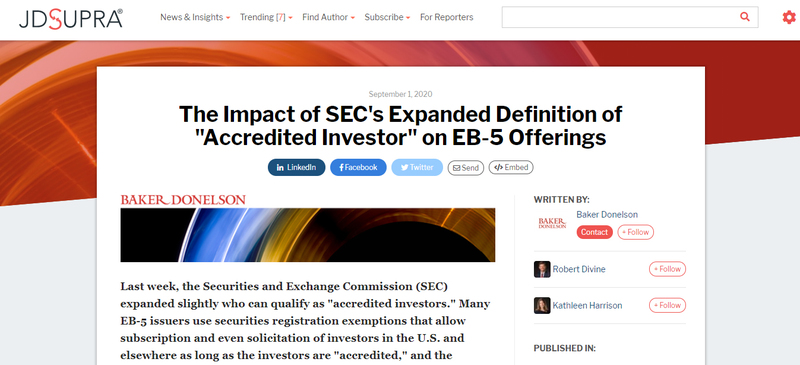The Impact of SEC's Expanded Definition of "Accredited Investor" on EB-5 Offerings
Last week, the Securities and Exchange Commission (SEC) expanded slightly who can qualify as "accredited investors." Many EB-5 issuers use securities registration exemptions that allow subscription and even solicitation of investors in the U.S. and elsewhere as long as the investors are "accredited," and the current definition focuses on the investor's (or investor's and spouse's) net worth or income. In about 60 days, the expanded rule will include investors with certain U.S. securities licenses (not often held by EB-5 investors), regardless of net worth, and it will let investors qualify based on net worth not only with a spouse but also with a cohabiting "spousal equivalent."
U.S. securities rules require registration of a securities offering – one that depends on the performance of others – unless an exemption applies. Many offerings rely on Regulation S applicable only to investors who are not in the U.S. and are not U.S. persons. For investors who may be U.S. persons or located in the U.S., and possibly for investors globally, most offerings rely on Section 506(c) of Regulation D, which allows general solicitation but limits purchases to investors who show the issuer that they are accredited. (Increasingly less frequently, another alternative is Section 506(b), which does not allow general solicitation but also does not require verification of an investor's accreditation.) EB-5 issuers, therefore, are familiar with the existing "accredited investor" definition, which uses wealth (specifically, income or net worth) as a proxy for financial sophistication. The SEC's announced changes broaden the scope of investors who qualify as accredited investors and may be eligible to participate in such offerings as a result.
The SEC's expanded definition includes natural persons who hold "in good standing one or more professional certificates or designations or credentials from an accredited educational institution that the SEC has designated as qualifying an individual for accredited investor status." Initially, the SEC issued an order that persons holding Financial Industry Regulatory Authority Inc. Series 7, 65, or 82 licenses will qualify as accredited investors under this category, regardless of their net worth or income.
The SEC rule gives it the flexibility to reevaluate or add certifications, designations or credentials in the future, considering the following nonexclusive attributes:
- whether the certification, designation or other credential requires an examination (or series thereof) administered by a self-regulatory organization, other industry body or accredited educational institution;
- whether such examination is designed to demonstrate a person's comprehension and sophistication of securities and investing;
- whether a person who obtains such certification, designation or credential likely has knowledge and experience in financial and business matters to evaluate the merits and risks of an investment; and
- whether the fact that a person holds such certification, designation or credential is publicly available or otherwise can be independently verified.
Thus, institutions, industry bodies and other organizations can apply to the SEC for designation, and the public can also propose that the SEC designate certain degrees or programs of study. The SEC will post proposed additional certifications, designations and credentials on its website, and there will be an opportunity for public comment before the SEC issues a decision. Not many of those certifications will apply to typical EB-5 investors unless they include people with degrees or licenses.
Un-linking accreditation from net worth or regular income will have little effect on EB-5 investment also because the minimum EB-5 investment amount has increased from $500,000 to $900,000, which is only $100,000 short of the $1,000,000 net worth required for accredited investor status. The rules allow inclusion of the amount being invested, including administrative fee (typically $50,000 or more), as part of the net worth analysis. So, an investor need only have another $50,000 or so in net worth other than the EB-5 investment to qualify under the existing rules.
The SEC also announced other changes and clarifications to the existing income and net worth thresholds for accreditation. For example, the joint income and net worth thresholds already part of the "accredited investor" definition previously included only a person's spouse. Now, an individual will qualify as accredited if the person meets the joint income or net worth threshold with their "spousal equivalent." "Spousal equivalent" need not be a legally recognized relationship. It includes a "cohabitant occupying a relationship generally equivalent to that of a spouse." In addition, the SEC clarifies that a couple's "joint" net worth means their aggregate net worth, and the assets considered in calculating a couple's net worth need not be held jointly.
For the EB-5 industry, these changes may not greatly increase the market for EB-5 offerings immediately, but instead marks the beginning of a process of expanding the definition of "accredited investor" to include more types of professional certifications.
The announced changes will be effective 60 days after publication in the Federal Register. Discussion of other changes announced by the SEC, including additional categories of entities that qualify as accredited investors.
https://www.jdsupra.com/legalnews/the-impact-of-sec-s-expanded-definition-34371/
Mentions
States
- New York
Securities Disclaimer
This website is for informational purposes only and does not constitute an offer or solicitation to sell shares or securities. Any such offer or solicitation will be made only by means of an investment's confidential Offering Memorandum and in accordance with the terms of all applicable securities and other laws. This website does not constitute or form part of, and should not be construed as, any offer for sale or subscription of, or any invitation to offer to buy or subscribe for, any securities, nor should it or any part of it form the basis of, or be relied on in any connection with, any contract or commitment whatsoever. EB5Projects.com LLC and its affiliates expressly disclaim any and all responsibility for any direct or consequential loss or damage of any kind whatsoever arising directly or indirectly from: (i) reliance on any information contained in the website, (ii) any error, omission or inaccuracy in any such information or (iii) any action resulting therefrom.




